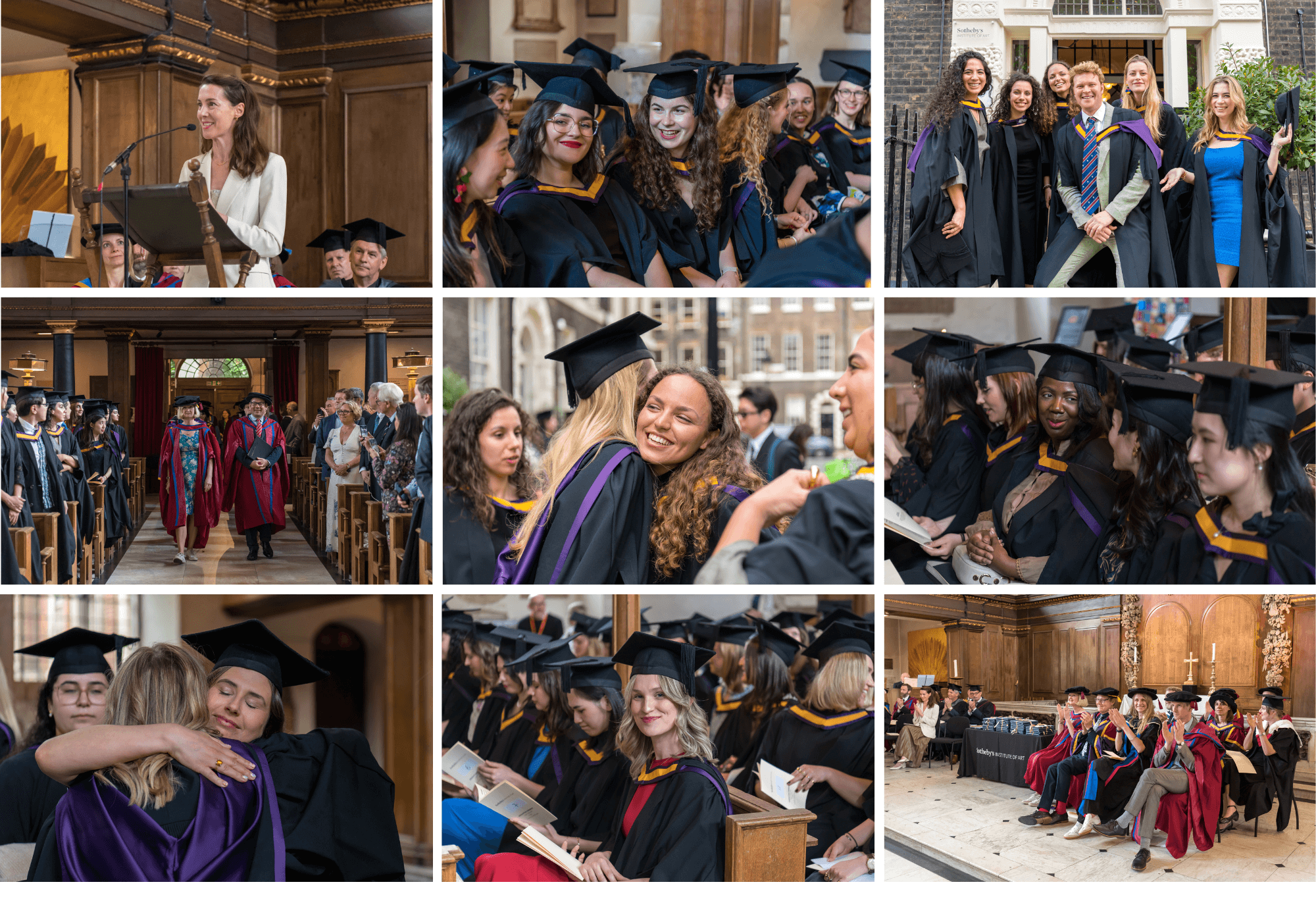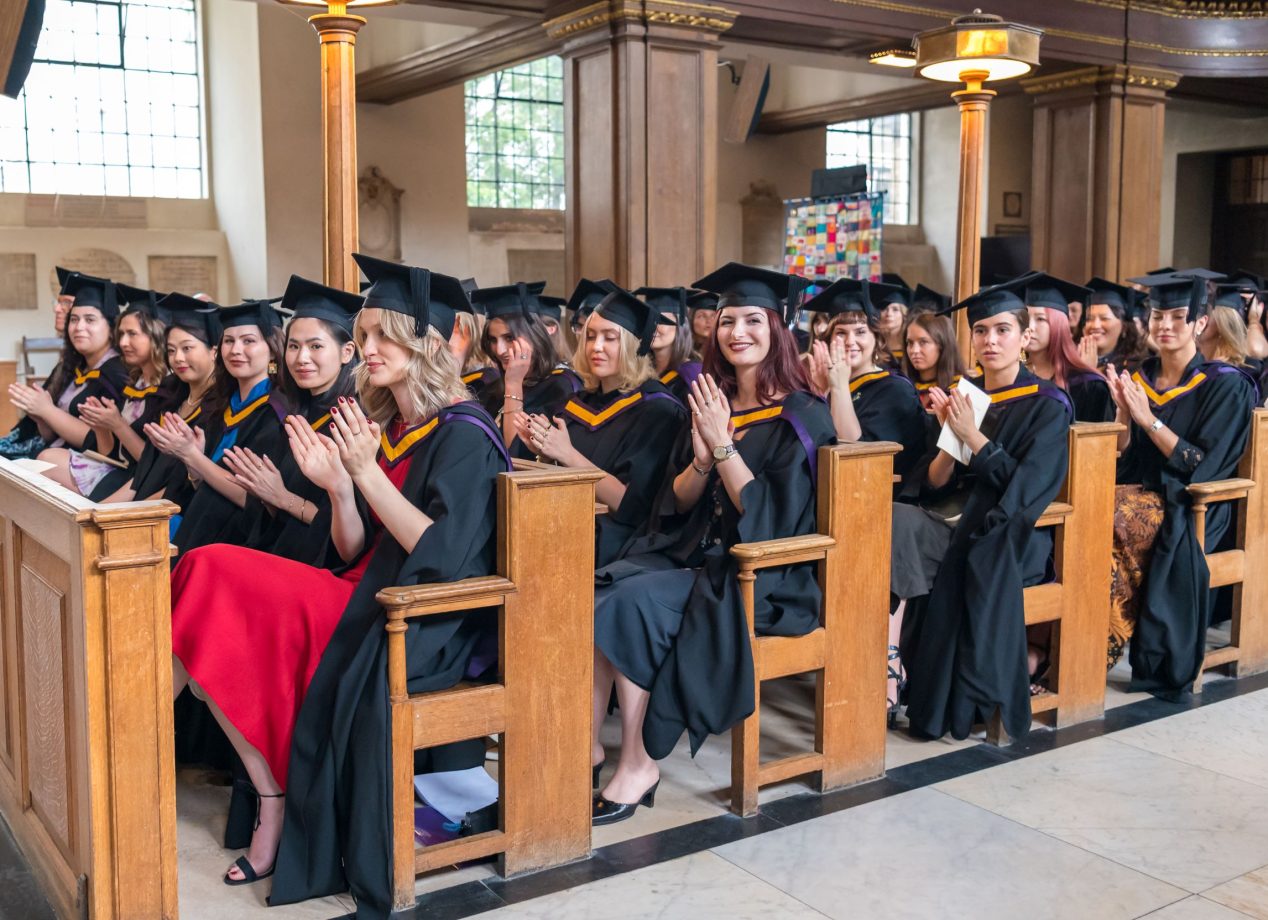Victoria Siddall Graduation Speech
Former Director of Frieze Art Fairs and Co-founder of the Gallery Climate Coalition
Sotheby’s Institute of Art-London Class of 2024
May 17, 2024
Welcome to the Sotheby’s Institute graduands and their proud friends and family, and also to members of the Sotheby’s Institute Governing Body and the faculty and staff. I am honoured to be asked to speak on this very happy and significant occasion and am really grateful to all of you for your warm welcome.
Most importantly, congratulations to all of you for achieving your MA – and also for choosing a subject that will take you into one of the most interesting and exciting worlds that it is possible to work in. Which other industry sends you to the opening of the Venice biennale on a work trip? More on that soon.
I confess I do not remember who gave my graduation speech, and it was such a long time ago that there is no record of this on my or anyone else’s phone, we only had pagers at the time with no camera function, or indeed on the internet which did not factor highly in my university years. All this is to say that I will very much understand if you remember nothing of this speech twenty five years from now, but I dearly hope that you will have enjoyed spending those 25 years in this industry as much as I have.
Because I have no recollection of my own graduation speech, I spent some time googling famous graduation speeches. It was intimidating – Steve Jobs set a high bar. And because one of the things I have learned is that you don’t always have to try to improve on a good thing, here is a quote from the speech that Steve Jobs gave to the graduates of Stanford University in 2005:
“Your work is going to fill a large part of your life, and the only way to be truly satisfied is to do what you believe is great work. And the only way to do great work is to love what you do. If you haven’t found it yet, keep looking. Don’t settle. As with all matters of the heart, you’ll know when you find it.”
You have chosen to study art and subjects related to art, which will make it relatively simple to take Steve’s advice. It is a subject that is very easy to love, and those of us whose work involves looking at it, exhibiting it, talking or writing about it, and even selling it, are extremely fortunate.
Writing this speech encouraged me to reflect on what has been most rewarding in my career, in the hope that I can pass on some useful advice. The rewards of a fruitful career in this sector will not only come from the obvious places – a prestigious role, a good salary. The moments that I am most proud of include launching new fairs like Frieze Masters and Frieze LA, of course. But they also include my voluntary role on the board of Studio Voltaire and supporting the team through a wildly ambitious capital campaign that doubled the amount of space for artist studios. Another was working with a friend to raise funds for the environmental charity ClientEarth through the sale of incredible donations of artworks from artists and galleries. This enabled the charity to open an office in the US, where they are currently bringing their first case against the owners of zombie oil wells. These roles were both voluntary and unpaid and essentially done in my spare time, but both are definitely on the list of the most fulfilling and rewarding things I have ever done.
My trustee roles include the NPG, the Ampersand Foundation, Gallery Climate Coalition, and Studio Voltaire. The fact that I said yes to them all gives you some idea of how enthusiastic I am about this kind of work – mainly for the impact you can have on an amazing organisation, but also for the benefits it offers personally and professionally.
All of these experiences have offered me opportunities to see things from a different angle, address new challenges, and be part of new communities. In the case of these roles, you definitely get at least as much as you give. So when someone asks you to join a non-profit board, you almost certainly won’t have time, but I would encourage you to do it anyway.
One of the wonderful things about the sector that you may be about to embark on a career in is that so little is set in stone. While people have been showing and selling art for centuries, the art world has never looked as it does today, the scale of what we now see, the presence of galleries and museums all over the world, is a relatively recent phenomenon.
The industry as we see it today can still be changed for the better, and even though it is wonderful, there is always room for improvement. It is an evolving world and you will have the chance to shape it, so I hope very much that you will feel inspired to leave it better than you found it.
In an unexpected career twist I have moved from running global art fairs at Frieze to leading climate initiatives for the art and music industries. One of these, Gallery Climate Coalition, now has over 1100 museums, galleries and artists in 40 countries signed up to a 50% reduction in emissions across the industry by 2030 – including Sotheby’s Institute. To quote one of the greatest of all time, Barack Obama, “We are the first generation to feel the impact of climate change and the last generation that can do something about it.” For many of us in the art world, we are trying to retrofit our practise and behaviours with this knowledge – for those just coming into the workplace there is a golden opportunity to put environmental sustainability and responsibility at the heart of your work from the outset.
And while I hope you will keep the planet in mind in your careers, there are many other issues to work on where change would make a positive difference. Gender balance, for example, is something we have seen huge progress on even in the time of my career. When I started at Christie’s in 2000, women had only just been allowed to wear trousers to work, and there were certainly no women running the major London museums. This has improved radically in that we now have women in some of the top jobs in the art world and cultural sector. However, when it comes to art sold at auction, there was more work sold by value over the past ten years by Picasso than by all women artists put together – so we still have some work to do.
I also want to talk about London and the UK for a moment. Not only have you chosen to study one of the best subjects, but you have chosen to do so in one of the greatest cities for art and culture in the world. London is a truly international city and a place that artists and other creatives move to from all over the world for the art schools, the museums, the opportunities to show and sell art, the rich artistic communities. There is nowhere with such a rich fabric of culture and museums which are predominantly free to access.
Not only that, but the UK art market was measured at nearly $12 bn in 2022, second only to New York, and bigger than the rest of the EU combined. The naturally self-deprecating attitude of the British may lead us to occasionally forget that we live and work in one of the most exciting, innovative and culturally ground-breaking places in the world but I would urge you to remind yourselves of this and revel in it.
A few final thoughts I would like to leave you with:
- The cultural sector exists because of artists. The money is necessary to get things done, but the art and the artists should always come first.
- The pandemic reminded us of the joy of being in the same room as art and people, relish it at every opportunity.
- Don’t underestimate the power of art and culture to shape and change society and the world – our actions can have ripple effects that go far beyond our own industry.
- You have as much right to be working in this sector as anyone else. If you ever have the feeling that you don’t belong, remember that you have an MA from Sotheby’s Institute, which already makes you more qualified than me.
- Finally, please never, never complain about being sent on a work trip to the Venice biennale. Your friends who are doctors and teachers will not understand!
Thank you so much again for asking me to speak today, good luck to you all in what I have no doubt will be fulfilling and impactful careers.
I wanted to end with a quote from an artist, and was curious to see if many artists had given graduation speeches. And of course they have. I learned that Mark Bradford decided not to prepare for his because he wanted to come on the day and feel the vibes and improvise from there – may we all be blessed with that courage and confidence. To end, here are some words from the great Carrie Mae Weems, in her speech at the Maryland Institute of Art in 2018:
"There is nothing more rewarding than doing what you want with your life. How do you measure your life? How will you measure your life? Hopefully, when you get far, far beyond this day in your lives and are deeply rooted in your work, regardless of how it turns out, you will look back on it and say, 'I have no regrets.'"

